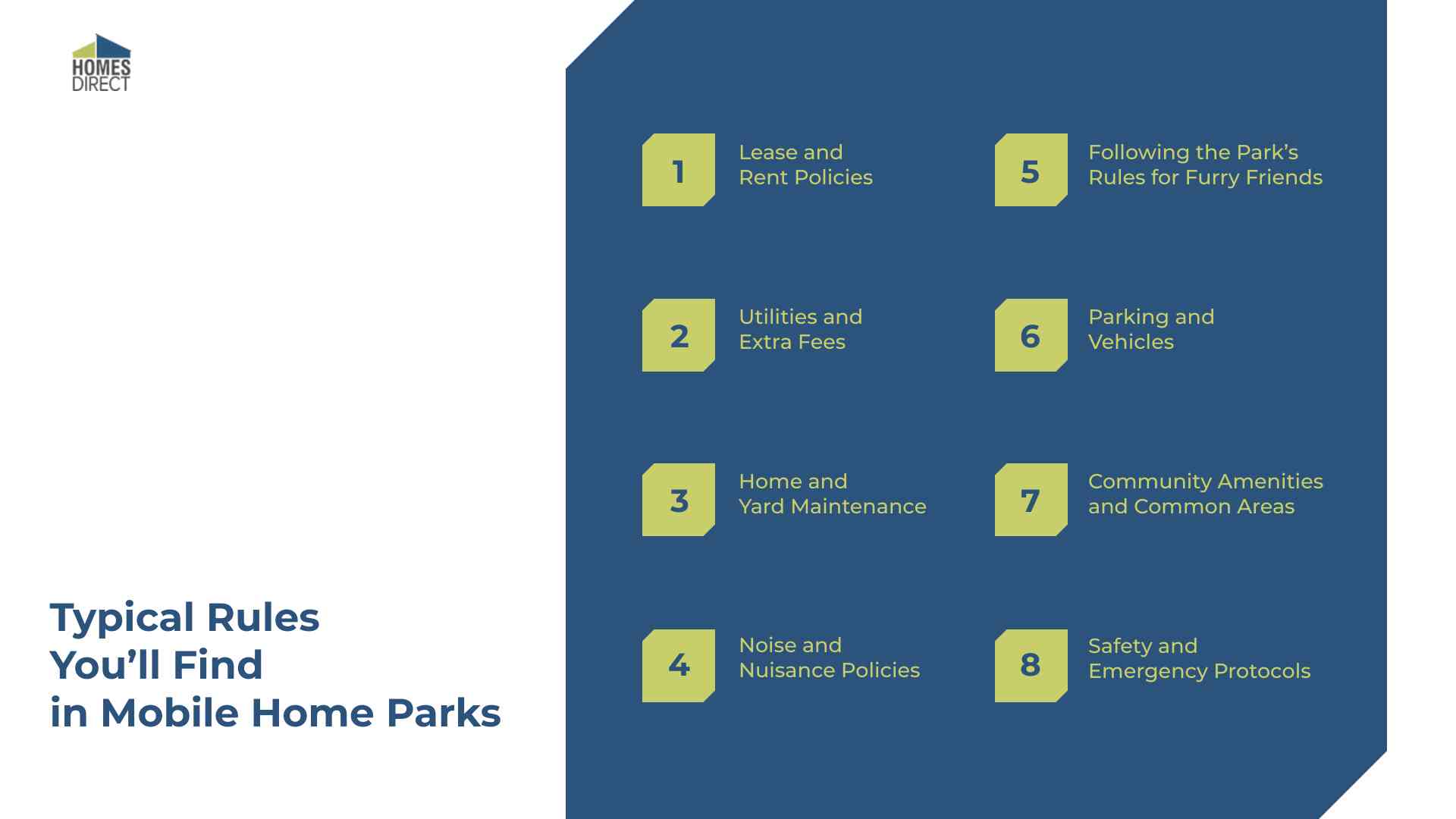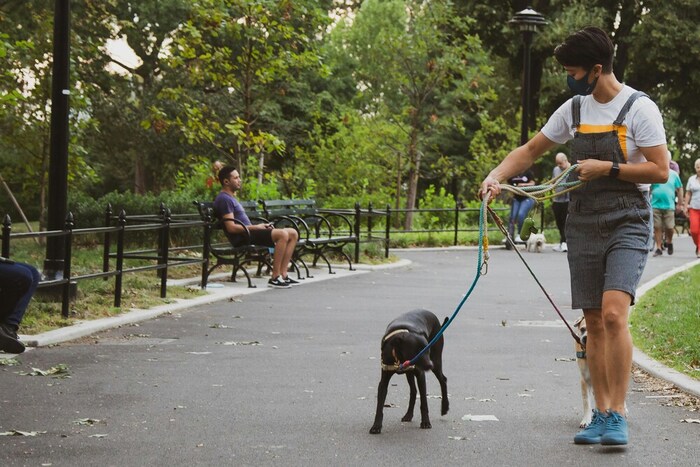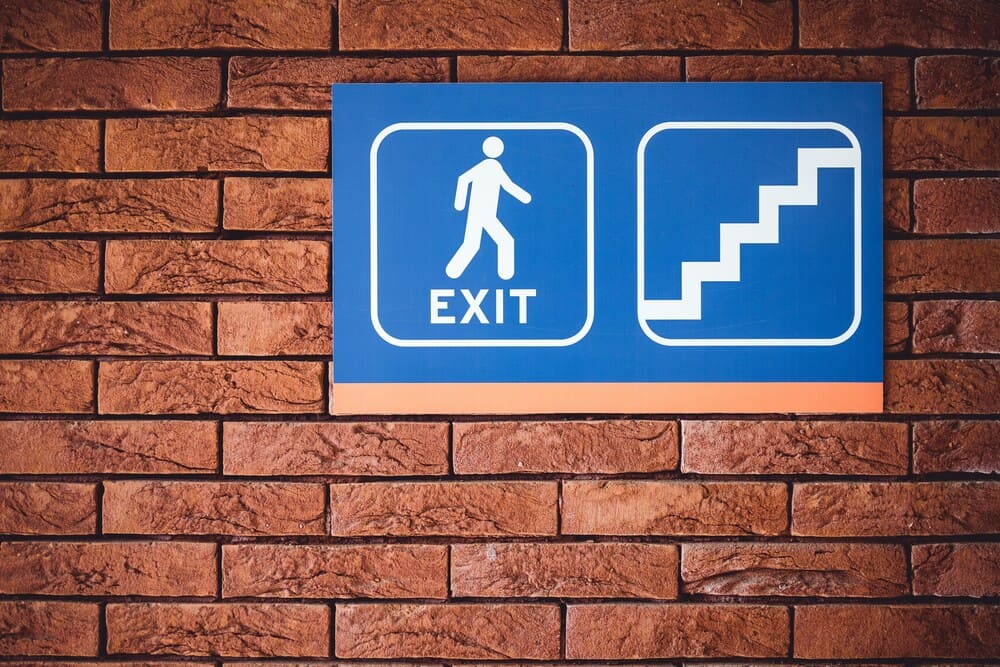Living in a mobile home park brings a blend of community spirit and affordability. However, as with any shared space, there are guidelines to help keep things running smoothly for everyone. Mobile home park rules may seem like a lot at first, but they’re in place to ensure a clean, safe, and pleasant environment for all. Here’s an easy guide to the rules and why they matter.

Why Rules in Mobile Home Parks Are a Big Deal
Mobile home parks are unique communities, with residents living in close quarters. This makes basic rules essential—not just to avoid problems but to keep things fair and comfortable for everyone. These rules often cover everything from keeping noise in check to maintaining a well-kept exterior for each home. When followed, they help build a neighborly atmosphere and protect property values, which benefits everyone in the long run.
Typical Rules You’ll Find in Mobile Home Parks
While every park has its specifics, most share some common rules. Here are the big ones to look out for:

1. Lease and Rent Policies
The lease is your go-to document for all things tenancy-related. It includes:
-
Rent amount and due dates: Typically, rent is due at the start of each month. Leases often outline penalties for late payments, so it’s smart to stay on top of the dates to avoid extra fees.
-
Security deposits and rent increases: You’ll likely need a security deposit when you move in, and many parks have the option to raise rent once a year with advance notice. Check the terms to avoid any surprises.
-
Renewals: When your lease term ends, some parks require you to renew. Getting ahead on this can help you avoid any gaps in your stay.
2. Utilities and Extra Fees
Some parks include utilities like water and trash in the rent; others bill them separately. If you’re planning to use additional amenities, such as a clubhouse or parking, expect that there might be some fees involved. Check the lease for specifics so you know what’s covered and what isn’t.
3. Home and Yard Maintenance
Keeping up the appearance of each lot is typically a big deal. You’ll likely be responsible for your lawn care—mowing, trimming, and keeping things tidy are usually required. This also extends to landscaping, so it’s a good idea to make sure your space stays neat.
-
Trash and recycling: Most parks have designated bins and require prompt trash disposal to keep things looking nice.
-
Home repairs: Many parks expect homes to look well-maintained, meaning repairs to things like broken windows or damaged siding need to be addressed. Regular upkeep is key to keeping the park looking sharp.
Read to discover how long mobile homes last
4. Noise and Nuisance Policies
To keep things peaceful, most parks enforce noise limits, especially during the night.
-
Quiet hours: Most parks set quiet hours, often from around 10 PM to early morning. This helps residents relax without loud disruptions.
-
Vehicle and pet noise: To maintain a calm environment, many parks restrict unnecessary vehicle noise and expect pet owners to keep their animals from disturbing neighbors.
5. Pets: Following the Park’s Rules for Furry Friends
Many parks are pet-friendly but have policies to ensure pets don’t disrupt the community:
-
Pet size and breed restrictions: While some parks allow pets, they might limit specific breeds or larger animals.
-
Leash rules and cleanup: Typically, pets must be on a leash when outside, and owners are expected to clean up after them promptly to keep the park clean and welcoming.

Source: Unsplash
6. Parking and Vehicles
Parking can be limited, so most parks have specific rules to manage space:
-
Designated parking: Each household may get one or two designated spots, with additional parking available for guests in specified areas.
-
Vehicle limits and restrictions: To avoid overcrowding, some parks limit the number of vehicles per household, and non-functional vehicles are generally not allowed to stay on-site.
7. Community Amenities and Common Areas
If the park offers amenities like a pool or clubhouse, you’ll find rules in place for keeping these areas safe and available to everyone:
-
Hours and guest policies: Common areas typically have set hours, and many parks limit the number of guests to prevent overcrowding.
-
Clean-up rules: Residents are often responsible for cleaning up after themselves in shared spaces. Many parks also restrict alcohol and smoking in these areas to keep things family-friendly
8. Safety and Emergency Protocols
In mobile home parks, safety and emergency protocols are essential for maintaining a secure living environment, especially given the close proximity of homes. The safety measures involve not only fire prevention but also plans for a variety of emergencies. Let's have a look at few of them:
- Fire Safety and Preparedness
Fire safety is a critical focus, as mobile homes are often more vulnerable to fire hazards than traditional houses. Many parks require residents to have smoke detectors and fire extinguishers in place, with detectors checked regularly to ensure they work in an emergency. Park management might restrict open flames, so fire pits and outdoor grills, if allowed, are generally confined to designated areas away from homes. Some parks may also prohibit certain fire-prone items, like fire pits or charcoal grills, to reduce fire risk.
- Evacuation Routes and Drills
Mobile home parks often establish evacuation routes specific to the layout of the community. These routes are meant to facilitate a quick and orderly exit in emergencies such as fires, gas leaks, or even severe storms. Some parks conduct regular safety drills to familiarize residents with these routes and emergency procedures, reinforcing a “preparedness” mindset. Knowing where these exits are, along with any designated meeting points, can make a significant difference in a crisis.

Source: Unsplash
- Severe Weather Preparedness
For parks in areas prone to hurricanes, tornadoes, or floods, weather-specific plans are often in place. Some mobile home parks have designated storm shelters or encourage residents to seek nearby community shelters when a storm is anticipated. Parks may also work with local authorities to alert residents about severe weather and update them on where they can safely evacuate or shelter in place. Residents are encouraged to keep an emergency kit with essentials like bottled water, medications, non-perishable food, and a flashlight, ensuring they’re ready for any sudden situations.
- Communication During Emergencies
A solid emergency communication plan helps to make sure that everyone receives timely and accurate information. Parks often use text alerts, sirens, or public announcement systems to inform residents of impending threats. Management may also hold periodic community meetings to review safety protocols, which can reinforce knowledge and make residents feel more secure about the park's readiness for emergencies.
Learn more: Mobile Home Insurance: Your Gateway to Secure Living and Smart Savings
Understanding Your Rights as a Tenant
Living in a mobile home park comes with both rights and responsibilities. Many states, like California, have laws that protect mobile home residents from unfair practices. Familiarizing yourself with these laws, like the Mobilehome Residency Law (MRL) in California, can help you know what to expect, especially if issues arise with rent increases or eviction notices.
In Summary
Mobile home park rules might seem like a lot to handle, but they’re meant to make community living enjoyable and fair for everyone. By keeping your lot tidy, following noise rules, and respecting parking guidelines, you’re contributing to a vibrant, welcoming community that you and your neighbors can enjoy.

